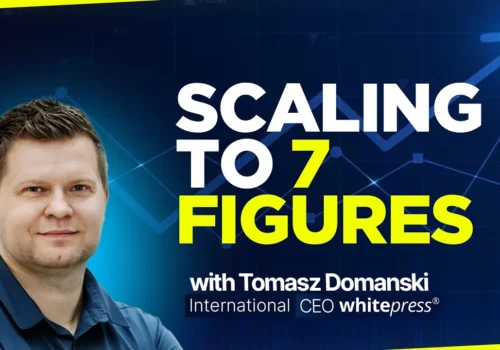We spoke with Roland Polzin, the co-founder and Chief Marketing Officer of Wing Assistant, about the impressive growth he drove over the past year, his unusual career, and some of his biggest challenges as an entrepreneur.

Roland, you have an impressive leadership background and an unusual CV as a German coming to the US to start a business. Tell us more about how you built Wing Assistant.
I joined my co-founders on campus at UC Irvine while I was doing my MBA. Back then, I was working with the team to create an on-campus student assistant app. However, we soon changed the business to become an upscale concierge app that we launched on Product Hunt and became the #1 Product of the day.
The pandemic struck down our business model, though, so we had to pivot: We adapted our backend technology and engineered a new software to cater to businesses – Wing Assistant was born! During the pandemic, I also graduated with my MBA and switched to a full-time work visa, and after we received our seed funding, I built a team as the CMO to grow our company from $0 to $10M+ in Gross Sales Volume in just about a year.
How is Wing different from other managed assistant providers?
Our strong growth is mostly attributed to our unique software approach in the outsourcing space. No other competitor offers a software suite like ours that makes delegating work to remote talent efficient, easy, and secure. Our software empowers businesses and their remote talent to perform at their best and has built-in technology to ensure continuous top-notch quality of the delivered work.
How do you define success as an entrepreneur?
Besides the metrics that are important to a particular business, for me, success lies in the positive impact I can have on people as well as on how much I learn and how much I can grow as a person. In that regard, achieving business metrics is a means to an end: While chasing strong growth and high revenue, I am constantly facing new challenges and learning new things every day.
All the while, by selling our amazing service to more and more people, my company gets to make their lives easier and their businesses more effectively. That is the success that makes long hours worth it.
What is the foundation of a successful SaaS company?
A strong team, a solid vision for the company, and enough fun in the day-to-day business to make working worthwhile. If you have these, you can conquer anything – while you might not find product-market fit in the first couple of months, a strong team will iterate around small successes and increase the traction with every development cycle.
The company’s vision will keep everyone focused and engaged, and foster a bond between all team members. A positive company culture will make everyone on the team feel welcome and equip team members with a purpose that enables them to proactively drive company goals even without specific guidelines.
What advice would you give your past self about co-founding a company?
“Just do it”! In my early days as an entrepreneur, I applied the lessons I learned during my MBA. While my studies and my professional background have been very helpful, they were largely aligned with the bureaucracy of large organizations. This often means following strict guidelines and best practices to achieve success.
However, in a startup environment, by definition, there often are not enough best practices or guidelines available. Hence, it is a good idea to take action and try out new things even if those might fail. Making sure that failure is accounted for is the key to success here.
What is an important aspect of leading a company that most people overlook?
Many people are not good at delegating tasks. This skill is crucial for any business leader since doing everything yourself will ultimately make you the bottleneck of the organization. Rather, hire team members whom you can trust, train them in your ways, and then trust them to do work on your behalf.
The more autonomy you allow motivated people to have, the more they own their work and put effort into it. If you don’t know where to start, simply use the SMART goal structure to delegate tasks and sync regularly with your teammates to make sure everyone is on the same page.
Did you want to build a business when you were younger? What sparked your interest?
Even as a kid, I was keen on building things. My grandparents lived on a farm in the countryside in Eastern Germany. Every school holiday, I would visit and work to make some pocket money. I built fences for the horses, dug dirt to create fields for growing vegetables, and created water drainage systems to cope with heavy rains.
Later in high school, I started my own computer service business, assembling and installing computers for private people. I loved both of these jobs because I had agency over how I shaped the things I am building – this is still true today, and the most important driver for me to be an entrepreneur.
What is it like co-founding a SaaS company when you’re a 100% distributed team?
It’s fantastic since it provides everyone on my team with the luxury of working from home, and even working flexible hours whenever feasible. It does require stringent project management, though, to make sure team members are aware of whom they are working with and what the deadlines are.
This is especially true for interdepartmental projects since remote work creates a need for more deliberate communication. I make sure to have several daily check-ins for all team members, and at least a larger weekly meeting with an expanded circle to ensure that everyone is on the same page. In addition, we frequently hold virtual happy hours to provide an opportunity for everyone to interact in a casual setting and enjoy themselves.
What’s the biggest challenge you’ve had to overcome as a SaaS co-founder?
The emotional rollercoaster. And this, by the way, is a constant challenge that never ends when you are running a business – your highs are high when you receive a big round of funding or when you close a big customer, and your lows are low when you are burning through cash and you are not sure whether the business is going to survive for another year.
I have learned (and I am still learning) to focus on the opportunities and the good things that are happening as well as to reflect on tough situations and not let them consume me. Meditation has been a newfound tool for me that helps calibrate my focus and prevents me from worrying too much about things that I am unable to change.
Tell us about a time you had to think out of the box in your role as CMO. What were you trying to solve? What were the results?
One example is our website chat. While offering a 24/6 live chat experience is not groundbreaking, it was (and still is) a first in our industry. Now, since many of the incoming chat inquiries result in new sales, we had to find a way to make our ad platforms register these actions as marketing attributions.
Since there is no direct integration of our chat platform with ad platforms, my creative solution was to have one of our engineers write a simple script that would trigger an action every time a certain keyword was mentioned in the chat. This way, we were able to positively reinforce the ad platform algorithms and enable them to send more of this well-selling traffic.
What do you think of the current state of the outsourcing and freelancing industries, and where do you see it going in the next few years?
The pandemic has accelerated remote work, which is one of the few good things that came from it – think of the additional flexibility people get as well as the savings in CO2 emissions resulting from avoiding commutes to just name two advantages.
However, the vast majority of traditionally run businesses have still not fully understood the potential of outsourcing complete business functions to a remote labor force. To me, this is an extra motivation to educate executives about this potential and unlock a completely new level of productivity for them.
What motivates you to get out of bed in the morning?
The people who are working for my company. We have a fantastic team of people who are working from literally all around the world, often through the graveyard shift to make sure everything runs smoothly. Doing my part as a leader to enable them, and making sure the company gets a little better every day is my personal mission that makes me wake up eager to start every morning.
Quick Links:




